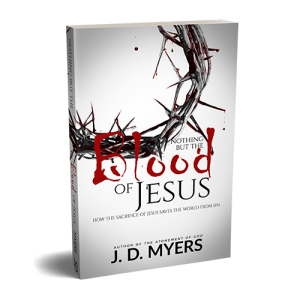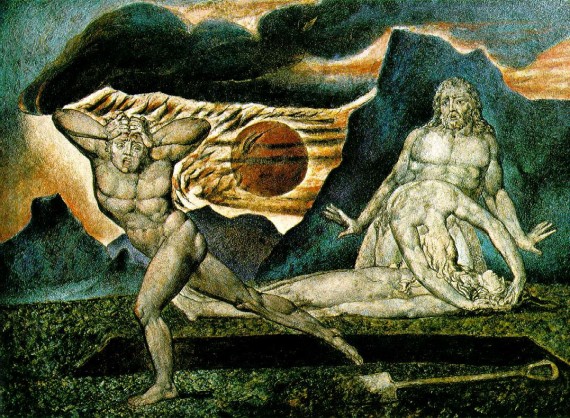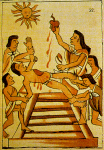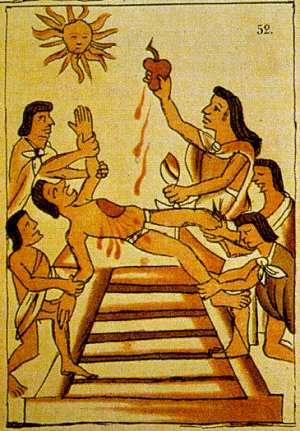 In one of his recent email newsletters (which you can read here), pastor and world-renowned theologian Greg Boyd included a review of my book, Nothing but the Blood of Jesus. Below is his review, interspersed with my comments and responses.
In one of his recent email newsletters (which you can read here), pastor and world-renowned theologian Greg Boyd included a review of my book, Nothing but the Blood of Jesus. Below is his review, interspersed with my comments and responses.
Before we get started however, let me state a critique of Greg’s critique. The vast majority of Greg’s critique of my book is focused on one-fifth of the book, namely, the two chapters on scapegoating. Yet the ideas in these two chapters were built on the ideas from the previous six chapters (two each on sin, law, and sacrifice). And as I read Greg’s critique of what I wrote about scapegoating, I gained the distinct impression that he had not seriously read the previous six chapters, where many of his concerns are addressed.
Even then, as I read Boyd’s critiques of scapegoating, I once again had the distinct impression that what I wrote was being misunderstood and misrepresented. For example, some of what Greg says I wrote about Achan in Joshua 7 is not actually found in my book. Yes, if certain statements are read out of context, I could see how Greg could get his ideas from what I wrote.
I feel that if Greg had let go of some of his presuppositions and had considered the five themes of my book as a whole, some of his critiques below would not exist.
All authors deal with this. Greg has said the exact same thing to me about my critiques of his cruciform thesis. In response, I have tried to listen more closely and read his books more deeply so that I might better understand. I also appreciate him taking the time to engage with me in dialogue.
So here is his review with my responses. His review is in the blockquotes.
I met Jeremy Myers at the ReKnew Cross Vision Conference and he graciously gave me a copy of his book, Nothing But the Blood of Jesus. I had read Jeremy’s review of my book, Crucifixion of the Warrior God (CWG) as well as other reflections of his on a Facebook page dedicated to discussing this book, so I was aware that our views overlap on certain points and diverge sharply at others. Reading Nothing But the Blood of Jesus clarified these points of agreement and disagreement.
It was great meeting Greg. I especially enjoyed meeting many of the other people who attended the conference, some of whom already knew me from my books and podcast.
Greg mentions the Facebook group, which he also mentioned at the conference in the Saturday morning session where he and I talked on stage for a couple minutes. At that time, I think he said the group was vitriolic. I never saw any vitriol there, but that might be due to the fact that I was not really active in this group. I never once made a post, and I commented a grand total of 12 times. So I find it strange that Greg associates me with the group. I hope he doesn’t think I am vitriolic.
 He probably associates me with the group because someone in the group created a post which contained my review of Greg’s book. They pulled the review from my site at RedeemingGod.com, which can be found here. I reviewed the follow-up summary volume, Cross Vision here.
He probably associates me with the group because someone in the group created a post which contained my review of Greg’s book. They pulled the review from my site at RedeemingGod.com, which can be found here. I reviewed the follow-up summary volume, Cross Vision here.
Anyway, it’s not a big deal, but I was surprised at the conference (and here again) that I am associated with a Facebook group in which I had almost no involvement. Still, it’s a great group, and if you want to discuss the themes of Greg’s book, or non-violence in general, you can go request to join the group here. If you join, just don’t be vitriolic! Ha!
The central thesis of Jeremy’s work is that “the blood of Jesus” is the solution to the problem of sin not because it placates the Father’s wrath or somehow magically washes away our sin, but because Jesus’ death on the cross exposes the true nature of sin and calls us to live free from it. But before we can understand, let alone critique, Jeremy’s thesis, we need to know something about René Girard (1923-2015), a French historian and philosopher of social science whose work has proven increasingly influential in Western theological circles over the last several decades. The reason we need to first understand Girard is because Jeremy’s thesis is heavily reliant on the work of Girard.
I don’t know if “heavily reliant” is the right term. As any honest theologian will admit, my ideas are built on the shoulders of numerous scholars and authors who have influenced my thinking over my years of study and research. So, for example, at various places in the book, I give credit to Fleming Rutledge, John Sailhamer, Mark Biddle, and several others.
Furthermore, while Girardian thought did indeed influence my thinking on some areas, it is not actually his books that influenced me most, but the books of several other Girardian scholars, such as Mark Heim, Robert Hamerton-Kelly, and Gil Bailie. But regardless, I fully admit that Girardian insights into anthropology and sociology have influenced my thinking about life and Scripture, as have the views of Greg Boyd, C. S. Lewis, N. T. Wright, Sharon Baker, Robert Farrar Capon, Zane Hodges, Brian Zahnd, Brad Jersak, and numerous others. (Reading these people’s books will transform your life and theology!)
As Jeremy makes clear in his book (155-64), the core of Girard’s theory is that humans are by nature imitators. We thus find ourselves desiring what others desire, which leads to rivalry and, inevitably, to violence. Since everybody is subject to this process, all social groups would eventually descent into total anarchy were there not some mechanism for channeling our violence away from the group toward another. Girard argues that throughout history social groups have survived by placing the blame for the group’s inner conflict on a “scapegoat,” which typically is a person or group that is vulnerable and “different” from the majority within the group (164).
The inner conflicts of the group are overcome as they unite against this common enemy and punish them for their alleged crimes, usually by killing them. What they are actually doing, however, is projecting their own guilt onto this scapegoat and punishing this scapegoat as a means of saving themselves. One dies so that the others may live. This scapegoating process, argues Girard, is most frequently justified by claiming it reflects God’s (or a god’s) will, and the fact that the death of the scapegoat succeeds in temporarily restoring peace to the group is interpreted as a confirmation this conviction.
Jeremy shows how imitative (or mimetic) rivalry led to the first act of violence recorded in the Bible, when Cain killed Able (Gen 4). Jeremy finds it highly significant that this episode also happens to contain the first mention of “sin” in the Bible (42). For this and other reasons, Jeremy argues that mimetic rivalry and the violence and scapegoating that follows it is the “foundational sin” of the Bible (217), and it expresses the essence of sin throughout Scripture. Indeed, Jeremy claims that “[e]verything in Scripture is focused on revealing this one truth to us,” namely, that throughout history humans have “engaged in rivalry, accusation, and violence” (119, cf. 152, 179). In Jeremy’s view,
“This is why the Bible contains more violence than any other ancient religious text. The Bible places so much emphasis on war, violence, bloodshed, and sacrifice because God wants to reveal the true source of violence and sacrifice, and in so doing, put a stop to it. The Bible emphasizes sacred violence, not because God is violent, but because we are” (121).
As is true for Girard, Jeremy holds that Jesus is God’s solution to this foundational sin. God became a human and died as an innocent scapegoat on the cross to expose the lie that our scapegoating reflects God’s will. “He died to take away and bring an end to sacrifice…by revealing through His own sacrifice at the hands of men that God does not want sacrifice; we do” (151). Since “the sin of scapegoating is the primary sin of humanity since the foundation of the world…the primary task of Jesus [is] to deliver us from our slavery to this sin by both exposing it to us and showing us how to live differently” (197). Hence, Jeremy argues, Jesus “is the perfect revelation about the truth of scapegoating” (173).
 Overall, this is not a bad summary … of about one-fifth of the book. The two chapters on scapegoating in the book are heavily dependent upon the six chapters about sin, law, and sacrifice, which are barely mentioned above. But as I well know, a book review cannot include every detail lest it become a book itself.
Overall, this is not a bad summary … of about one-fifth of the book. The two chapters on scapegoating in the book are heavily dependent upon the six chapters about sin, law, and sacrifice, which are barely mentioned above. But as I well know, a book review cannot include every detail lest it become a book itself.
However, I feel that most of Greg’s criticisms below could have been avoided if the 40 pages he summarizes above were read in light of the other 220 pages.
There is a great deal to praise about this insightful work. The conviction that God’s nature is love and, therefore, that God is opposed to all forms of violence is beautifully expressed throughout this work. Related to this, Jeremy insightfully expresses the understanding that Scripture’s violent portraits of God are the result of people projecting their own sin (including their fallen conceptions of God) onto God. In the process of making a scapegoat out of others, he argues, we make scapegoat out of God, and God, in his patient love, allows us do it. Readers of my CWG and/or Cross Vision (CV) will have no trouble understanding why I appreciate these views of Jeremy.
On top of this, Jeremy does an excellent job showing how the cross exposes the sin of scapegoating and how it calls us to an altogether different way of resolving conflict, namely, forgiveness. Moreover, his several discussions of the law and sacrificial system as divine accommodations to the fallen state of God’s people were astute, as were his many trenchant critiques of the Penal Substitution model of the Atonement that run throughout this work. I also think most readers will be aided by Jeremy’s discussion of two different kinds of forgiveness in the New Testament (231-32) as well as by his discussion of Hebrews 9:22 (244-47), which has wreaked so much havoc with atonement theories, to be informative and helpful.
Particularly helpful to me was Jeremy’s argument that the reference to “the lamb slain from the foundation of the world” (Rev 13:8) “reveals that this is the way God has always been. He has always been an innocent Lamb who allows Himself to get slain for the sake of others” (203). I find this interpretation to be compelling, no doubt in part because it provides solid support for my claim (defended in CWG and CV) that God has always stooped to bear the sin of people, thereby taking on an ugly appearance in the biblical narrative that reflects that sin, just as he does on the cross. And finally, readers of Nothing But the Blood of Jesus will find they are given a clearer understand of what “the blood of Jesus” actually means – and, just as importantly, what it does not mean. For these and a multitude of other reasons, I recommend reading Nothing But the Blood of Jesus.
Thank you for the kind words, Greg! Now, let’s dive into the disagreements!
Of course, this is not to say the book is not without its shortcomings or that I agree with everything in it. Truth is, I consider several of our differences to be rather stark and quite important. Nevertheless, given our core agreement on God’s loving, non-violent nature and on the correct non-violent way to interpret Scripture’s violent portraits of God, my critiques should be understood along the lines of a friendly “in-house” debate. I’ll make two critical comments concerning the style of Jeremy’s work and four critical comments concerning its content.
First, while Jeremy has a very readable writing style, this book is frankly quite repetitive. Part of this is inevitable given that the book is organized around a discussion of five words (“Sin,” “Law,” “Sacrifice,” “Scapegoat,” and “Blood”) and, as Jeremy himself acknowledges, the meaning of each one is wrapped up with all the others. But much of the repetition is unnecessary. Repetitions are not only found throughout the book, but often in a single paragraph. To pick out one random example, Jeremy at one point says that Jesus
“…was innocent of all wrongdoing. Even though most scapegoats are guilty of some of the things for which they are accused, Jesus was completely innocent….Though the best scapegoat is a guilty scapegoat, the perfect innocence of Jesus reveals that scapegoats are typically not guilty of everything for which they are accused….Though Jesus did serve in the function of a scapegoat, He is not called a scapegoat because He could not justifiably be accused of any wrongdoing. Jesus was a scapegoat, but He was an innocent scapegoat.”
To this, I say, “Guilty as charged.”
I am intentionally repetitive, because I seek to explain new concepts to people in different ways using different words so that they understand what I am (and am not) saying. Only professional theologians and scholars are likely to quickly grasp the nuances of a particular statement, and so I hope that by stating the same idea in different ways, the point becomes clear.
On the other hand, maybe this is just a fault of all theology books. I personally found CWG to be quite repetitive, including numerous sections (even entire chapters) that could have been cut from the book without any detriment to the overall argument.
So could the book have been more succinct? Of course. Should it have been shorter? Maybe. Will the point of the book have been as clear with these subtractions? It all depends on who you ask.
I think an editor’s razor could have tightened up this paragraph as well as the entire book.
I paid for editorial services on this book. But again, this is a subjective criticism that I am not certain all share with Greg.
Second, and more significantly, with only a couple of exceptions, Jeremy doesn’t cite his sources. Now, this book is intended for a popular audience, so heavy footnoting is not to be expected. But even in popular works it’s customary for authors to cite sources from which they got their information and/or ideas. The most glaring example of this is that, even though Jeremy’s work is thoroughly indebted to Girard, he never once mentions him or cites any of his works. I am certain this is not intentional on Jeremy’s part, and it likely wouldn’t bother most lay readers. But protecting “intellectual property” is a huge deal among academics, and this omission would cause suspicion. Citation of sources would also help readers check out some of Jeremy’s more controversial claims and engage in further reading instead of just take his word for it.
I take great effort and care to cite my sources. I always cite a source when I know I am referring to them. I never cited Girard because although some ideas in my book are “Girardian” I have not found his books to be all that helpful for understanding his theory. Sorry, René!
Maybe a quick summary of my approach to writing will help shed light on the lack of footnotes. When I want to study a topic, I buy and read every book I can think of on the subject. Then to solidify the ideas in my own mind, I sort through the ideas and arrange them in a logical order (at least to me). Then I write it all down. I rarely go back to look at the books I read. I say this with apologies to all the authors I have read that didn’t get mentioned in the book. I know it is a weakness to my writing approach … especially with this book.
Probably what I should have done (and will do in future editions) is include a list of suggested resources at the end of the book. This list would have begun with a statement that the following books were highly influential in helping shape my views and ideas in the book.
Part of problem with this book in particular, however, is that I never planned to write it. During my reading and research on the problem of divine violence in Scripture, I planned to write a book titled When God Pled Guilty. Currently, that book sits on my computer hard drive at 200,000 words with several hundred footnotes. I shelved that book about five years ago to write a different book, which became seven books, which I am now in the process of writing. I never planned to write Nothing but the Blood of Jesus.
But one night, in my weekly discipleship group study, as I was explaining some of the content from one of those seven forthcoming volumes, the outline for Nothing but the Blood of Jesus popped into my head, and I knew I had to write it. So I did. It took a couple weeks of frantic writing, pouring out the “fire in my bones” onto the written page, but the entire book was written in a very short span of time. This accounts for most of the lack of footnotes in the volume. But ample citations are in the original volumes, which will be published (hopefully) in the next several years.
Nevertheless, numerous citations do not prove the accuracy of an argument. Anybody can quote dozens of sources, just as anybody can quote dozens of verses. Arguments must be dealt with on their internal logical and merit, and nothing else.
My approach to writing also suffers from one other drawback. Unlike Greg (and most other scholarly authors), I don’t have a team of research assistants to help me track down resources. I don’t have a Paul Eddy. I don’t have any grad students. It’s just me. And while I do try my absolute hardest to give credit where credit is due, I often forget where an idea might have come from, and so fail to provide a citation.
However (and this is not an excuse), all authors neglect to cite sources … even Greg. What I find most interesting about Greg’s critique on this point is that although he himself included hundreds of footnotes in his book, he did not include various resources which he himself had referred to elsewhere in his writings as helpful. For example, Greg wrote on his blog that he had enjoyed reading the insights of Marilyn Campbell’s book, Shedding Light on the Dark Side of God (which is now titled Light Through Darkness).
Yet Greg never once cites Marilyn in his book. Does this mean he didn’t learn anything from her after all? Or maybe Greg doesn’t feel that he needs to cite self-published authors? Is it because she’s a woman or doesn’t have a Ph. D.? I know enough about Greg to know that none of these suggestions are remotely possible. The truth is that no author can ever adequately cite every source and resource to which they are accountable. We try as best we can, but we always fail.
Oh, and as for my more my “more controversial claims,” I take full blame for those. There is no one to cite, because these ideas came from my own research and study of the biblical text in light of the crucified Christ. I hoped that readers would consider the logic and reasonable arguments of my position based on the other ideas presented in the book, and then study them further on their own to see if these things are so.
Once again, Greg himself makes many controversial claims in CWG and CV, many of which have no citations because they originated with Greg. Readers are invited to consider the weight of his arguments and decide for themselves if what he says makes sense.
But we better move on. This is too long of an explanation about citations and footnotes.
Turning to the content of this work, my first and most substantial comment concerns the Girardian framework Jeremy uses to interpret Scripture. I confess that I am always suspicious whenever anyone tries to interpret the Bible through the lens of an extra-biblical idea, philosophy, or theory. So when Jeremy claimed that “[a]lmost every passage in the Bible teaches the truth about scapegoating in one fashion or another”(179) and that “[e]verything in Scripture is focused on revealing [that] [f]rom the beginning…humans have engaged in rivalry, accusation, and violence” (119), I was immediately concerned that everything in the Bible was being forced into the Procrustean bed of Girardian theory.
It is strange that Greg seems to be unaware of his own Procrustean bed which forms the foundation of his own thinking and theology. Or maybe he is, and he just wants to point out mine? I hope Greg doesn’t make the mistake of thinking that he has a purely exegetical theology. Every theological position is influenced by history, culture, education, family, emotional state, psychological background, traditional practices, and a vast constellation of other factors.
I am happy to do my best to own up to mine and agree that mimetic theory has been influential in my thinking and writing. However, if Greg does not like the Girardian framework, that is completely fine, but he must show why it is faulty before telling me I depend on it too much. Also, Greg must also admit that he himself interprets the bible through the lens of extra-biblical ideas. It is better by far to know what forms the foundation of your thinking than to be ignorant of such presuppositions or to claim you are not subject to them. I admit and am aware of being influenced by Girardian thought. If Greg wants to disabuse me of it, he should disprove it rather than simply point it out.
There were points in this work that I saw this happening. For example, we’ve seen that Jeremy regards scapegoating as the “foundational sin” of Scripture, and he makes quite a big deal over the fact that “sin” is first mentioned when Cain kills Abel. But it seems to me that the “foundational sin” in Scripture takes place prior to this, when Adam and Eve believe the serpent’s lie about God and when they therefore proceed to violate the divine prohibition against eating from the Tree of the Knowledge of Good and Evil (Gen 3:1-5). This sin certainly leads to Adam blaming God and Eve while Eve in turn blames the serpent (Gen 3:12-13), and one could argue that this indicates they are heading down the Girardian path of violence and scapegoating. But the foundational sin that sets this process in motion is mistrusting God and trying to be wise like God, not violence.
I don’t know that this is a Girardian idea. Yes, Girard says that there is a founding murder at the root of all civilization, and he does indeed point to Cain and Abel as a founding murder, but does he ever equate this with sin? I do not recall if he does. I think that this might be one of my more controversial claims in the book, for which I take full blame (or credit, as the case may be).
However, here again, if Greg disagrees, then I invite him to present exegetical arguments to the contrary. Just because traditional theology assumes that “sin” occurred when Adam and Eve ate from the forbidden tree, this does not mean that traditional theology is correct. The Bible doesn’t define their actions as sin, and so why should we? And yes, I discuss Romans 5:12 in the book.
So once again, if Boyd doesn’t like Girard, that’s fine. But rather than discount an idea because of its origin, ideas must be dealt with on their own terms, regardless of who else believes them.
Similarly, throughout this work Jeremy virtually equates sin with violence and/or scapegoating (e.g. 52, 204, 222, 250). It seems to me, however, that the biblical conception of sin is a good bit broader than this, the above-mentioned sin of Adam and Eve being a case in point. Jeremy several times says that sin is anything that makes us less human, which I fully agree with. But it seems to me that there are many things other than violence that can do this. If a person is a chronically lazy glutton, for example, this is sin (Tit 1:11-13), and I am certain it is so because this person is not living up to their human potential. Yet I don’t see how laziness fits into the Girardian schemata of sin.
Again, I don’t exactly know how Girard defines sin. I take blame for this definition. Well, Mark Biddle’s book on sin was helpful as well. But not Girard, if I recall correctly.
Anyway, while I admit that my definition of sin is new to some, it must be considered on its merit, and on the revelation from Scripture. “Sin” is not necessarily “the bad things we do” as Greg seems to believe. (I don’t actually know what he believes. How does he define “sin”?) While the passage he quoted, Titus 1:11-13, does mention lying and lazy gluttons, it doesn’t mention sin. So I am unsure why he cited that text as a way to disprove what I argue about sin in the book. Similarly, Greg eisegetically reads the concept of “sin” into Genesis 3. It is not found there exegetically
Most of the time, in Scripture, when “sin” is explicitly mentioned, it is usually mentioned in the context of violence, or the types of actions that lead to violence (e.g., rivalry, blame, accusation, etc.).
Another example where I felt Jeremy’s Girardian framework was distorting Scripture was when he claimed that “the main point”’ of the book of Job “is that we humans often engage in the satanic activity of accusing and blaming others and that we do so ‘in the name of God’”(197). While I grant that this is one of the points of Job, I am quite certain it is not the main point.
Consider the fact that Job blames God just as much as Job’s “friends” blame Job, which is why God has to put Job in his place in the three chapter monologue toward the end of the book (chs 38-41). And in this case, Job is not projecting his guilt onto God. Indeed, the main point of the book of Job hinges on the fact that Job is suffering as an innocent man (Job 1:1-5, 8). Job’s blaming God for his troubles thus has nothing to do with mimetic rivalry or violence. As God points out, it rather has to do with Job’s complete ignorance of the unfathomable cosmos (chs.38-39) and of the forces of chaos (Behemoth, Leviathan) that God must contend with (chs.40-41). I would thus argue that the main point of the book of Job is that humans shouldn’t blame God for our misfortunes, because we don’t know much about anything (which, by the way, is illustrated by the fact that neither Job nor his “friends” ever learn about the random wager in the heavenly realms that led to Job’s sufferings). But if one is reading with Girardian glasses, one is going to miss this because it doesn’t fit into the Girardian framework.
I must confess that I am a little confused by Greg’s objection here. Greg agrees that Job blames God for what happened to him. And what happened to Job? A lot of violence. His crops were destroyed, his servants and children were killed, and Job suffered great sickness. And then Job blames God for all this violence. Since this is so, how can Greg then say that “Job’s blaming God for his trouble has nothing to do with … violence”? It has everything to do with violence. Then when God shows up, He tells Job He had nothing to do with it.
 “But” (as my wife pointed out to me once), “What about God’s deal with the devil at the beginning of the book? Didn’t God allow Satan to do all these bad things to Job? How is this not divine violence?” Excellent point, Wendy! My answer is that this proves that the book of Job is actually about the satanic activity of accusing and blaming others in the name of God. Satan is there in the beginning as the accuser, and the satanic presence is seen throughout the book as everyone is accusing Job, and Job is accusing God.
“But” (as my wife pointed out to me once), “What about God’s deal with the devil at the beginning of the book? Didn’t God allow Satan to do all these bad things to Job? How is this not divine violence?” Excellent point, Wendy! My answer is that this proves that the book of Job is actually about the satanic activity of accusing and blaming others in the name of God. Satan is there in the beginning as the accuser, and the satanic presence is seen throughout the book as everyone is accusing Job, and Job is accusing God.
Yes, Job and his friends never learn about this divine “wager.” But this is because the story is not for them, but for us. As a result, it is my belief is that the “divine wager” never actually happened. I believe the story of Job actually happened, but I do not believe that God makes deals with the devil which treats humans as “acceptable losses” in a cosmic game of “chicken.” The account of God’s deal with the devil at the beginning is the narrative framework that sets up the scene, and is then disavowed at the end of the story. In other words, Job 1 is the “human perspective” of what we humans think goes on in the heavens, and Job 38-41 is “God’s perspective” of what is actually happening.
A more detailed explanation will have to wait for a future book. The point is that in the book of Job, “there is something else going on” than what most people assume.
As a final example, Jeremy argues, in good Girardian fashion, that Achan and his family were scapegoated when they were burned alive (Josh 7:10-16). Now, the text says that this burning was commanded by Yahweh because Achan kept spoils when the Israelites vanquished the city of Ai. From a Girardian perspective, however, this killing must have been carried out to resolve some social conflict that had been building up. Jeremy thus argues that there was “rivalry among the people of Israel regarding the leadership of Joshua and the divisions of the land in Canaan,” and the slaughter of Achan and his family was carried out to resolve this rivalry (192).
The trouble is, there is no evidence of such a “rivalry” in this passage. So far as I can see, it is postulated only because Girardian theory requires it. Yet, Jeremy is so convinced of its truth that he claims that this is “the most obvious reading” (194) of this passage. Indeed, he argues that the whole “book of Joshua, like much of the Bible, is written to expose such thinking (viz. scapegoating) for the lie that it is” (195). I grant that some stories in Joshua and throughout the Old Testament can be interpreted as illustrations of Girard’s scapegoating process, but to claim this for the book as a whole is a bit much. But Jeremy goes so far as to suggest that this is what the original ancient author(s) of this book had in mind! To me, this simply reflects how thoroughly Jeremy’s reading of Scripture has been fused with his Girardian perspective.
Let me beat the same drum once again … I didn’t get this from Girard, or from any Girardian scholar that I recall. But I suppose it is true that a Girardian framework influenced my explanation of this passage. Regardless, the steps to reduce rivalry are quite obvious in Joshua 2–5, especially when compared to the problems Moses faced in his leadership of Israel. This is the point I make in the book. The opening chapters of Joshua must be read contextually, in light of the exodus and wilderness wanderings.
However, all of this is only prologue for the Achan story. I should have more clearly made this point about “prologue” in the book. Regardless, I nowhere suggested, as Greg implies, that the original author(s) of Joshua had Girardian theory in mind. Pardon me, but that’s preposterous. What I wrote is that that the book of Joshua, like much of the Bible, is written to expose the lie of human scapegoating.
Scapegoating is a biblical theme long before Girard picked it up.
To me, Greg’s comment simply reflects how little he understands the seriousness of scapegoating, or its universal pull on every human being. To Greg, and everyone else, I say, “Forget Girard, if you want. Let’s talk about scapegoating.”
My second critical comment about the content of Nothing But the Blood of Jesus is that, while Jeremy mentions Satan several times, neither Satan nor any other demonic cosmic agent plays a substantive role in his theorizing. I think his book suffers as a result. For example, Jeremy notes that, like so many today, biblical authors routinely blamed God for natural disasters. Since we know from the revelation of God in Christ that God is not behind violence, Jeremy argues that we should understand the violent portraits of God that include natural disasters to be projections of the biblical authors.
I completely agree, but in CWG and CV, I go further and argue, on the basis of the cross, that whenever the violence involved in a divine judgment cannot be attributed to humans, as is the case when the judgment takes the form of a natural disaster, we should attribute this violence to Satan and/or other demonic cosmic forces. Because Satan and demonic cosmic forces play no role in Girardian theory, however, Jeremy doesn’t take this option. As a result, he leaves the natural disasters that function as divine judgments completely unexplained.
For example, who or what caused the Flood (Gen 6-9)? While Jeremy is clear that it wasn’t God, he offers his readers no other alternative. He comes close to providing an answer when he notes that the violence involved in the Flood is attributed to the flood waters, not to God (184). But he fails to identify these flood waters as the Ancient Near Eastern way of referring to hostile cosmic forces that perpetually threaten the earth and that Yahweh (or, in other cultures, some other deity) must hold at bay. The result is that the undoing of creation that took place with the Flood is left unexplained.
And the same holds true for all other judgments of God in the Old Testament that involve violence that can’t be attributed to humans. By contrast, if we read Scripture through the lens of the cross, which is depicted in the New Testament as God’s culminating battle with the kingdom of darkness, then we will intentionally look for – and we in fact find – that demonic cosmic forces were at work in bringing about these sorts of judgments.
 I had a very similar conversation with Greg at the ReKnew conference, in which he stated that he also leaves natural disasters completely unexplained. He says, and I agree, that there are too many variables to determine the cause of any natural disaster. The only exception, Greg says, are the natural disasters found in the Bible. The Bible claims that these (in some way) came from God, and so therefore, they did. Call it Satan, the destroyer, or God withdrawing, these, and only these, natural disasters have some sort of divine origin. For many reasons, I find this explanation highly troubling, and extremely unhelpful. After all, if the CWG thesis helps us understand the Bible but not life, then it is not helpful and cannot be accepted.
I had a very similar conversation with Greg at the ReKnew conference, in which he stated that he also leaves natural disasters completely unexplained. He says, and I agree, that there are too many variables to determine the cause of any natural disaster. The only exception, Greg says, are the natural disasters found in the Bible. The Bible claims that these (in some way) came from God, and so therefore, they did. Call it Satan, the destroyer, or God withdrawing, these, and only these, natural disasters have some sort of divine origin. For many reasons, I find this explanation highly troubling, and extremely unhelpful. After all, if the CWG thesis helps us understand the Bible but not life, then it is not helpful and cannot be accepted.
But I am not writing this post to critique Greg’s views (though a few more will come below). I just want to point out that while it is true that I do not talk about satan or natural disasters much in my book, this is not because I don’t have a view on them. I do. But my book was primarily focused on human sin and what Jesus did to fix it. I am not prepared, as Greg seems to be, to say that natural disasters are sometimes the result of human sin. One of the primary things we learn from Jesus is that we need to stop blaming God (and humans) for the bad things that happen in this life. This includes natural disasters.
If this is true now (as I think Greg would agree), then it also includes historical natural disasters, including those found in the Bible. The biblical accounts of natural disasters, then, are revelatory, just like much of the rest of Scripture, about how we humans blame God for violence, whether it is our own sinful violence or natural violence. A more detailed explanation is forthcoming in a future book.
This then also helps us understand satan and the cosmic powers. I am not going to get into it here, but just as Greg thinks I have too weak a view of satan and demonic cosmic forces, I think he gives them way too much “personhood.” I heard Greg’s defense of his views at the conference. I have also read God at War and Satan and the Problem of Evil, and highly recommend both books. I completely agree that satan and the fallen powers threaten the world and the existence of humanity. But I have a completely different view than Greg does of what satan and the demonic forces are, where they came from, and how they interact with humans. And no, I didn’t get any of my views from Girard. Ha!
Yet, an even more fundamental problem with Jeremy’s book is that his way of interpreting Scripture has no room for the concept of God judging people, and this is my third critical comment. At a number of points in this book Jeremy says things like: “God doesn’t punish us for sin.” Rather, “Sin carries its own punishment” and God “works to rescue us from the punishment of sin” (51). Now, I fully agree that “sin carries its own punishment” and that God “works to rescue us from the punishment of sin,” but from this it doesn’t follow that “God doesn’t punish us for sin.” For as I argue in CWG and CV, when God sees that his merciful work to protect us from the natural consequences of our sin is harming us by allowing us to get further entrenched in our sin, God has no other choice but to withdraw this protection and allow us to suffer the destructive consequences of our sin. And this, I contend, is supremely illustrated when Jesus stood in our place as a condemned sinner on the cross. The Father withdrew his protection of Jesus and delivered him over to violent people, and Jesus experienced the God-forsakenness that is intrinsic to all sin.
I believe, which I thought I stated in the book, that we see God’s judgment of sin, death, and satan in the crucifixion Jesus. There are future judgments as well. But in all cases, these judgments are not God negatively punishing anybody for sin. Instead, the judgments of God are when God acts as judge to pronounce right judgments. That is, He names things as they really are. He exposes false testimony so that He might instead reveal the truth. Again, this is not from Girard, and a more detailed explanation will be provided in future volumes, though I believe I wrote some preliminary ideas about this in my book The Atonement of God.
As for this entire idea of God withdrawing from people when sin gets bad enough so that God lets sin, death, the devil, and the destructive cosmic forces have their way with humanity, I cannot object to this view strongly enough. Here is what many people (myself included) hear Greg to be saying about God:
You see? When Greg says that God simply “releases the destroyer” this is similar to Zeus saying “Release the Kraken.” In Greg’s view, God is not sending the destroyer, or even doing the destroying. He is just withdrawing His protective hand which holds the destroyer back. God is releasing the destroyer to let the destroyer do what the destroyer does. I am sorry, but this concept comes straight out of pagan mythology.
Yes, I know this idea is found in various places in Scripture, as laid out in Greg’s books, but Jesus repudiates all these ways of reading such passages when He shows that God will never leave us nor forsake us and will always be with us, no matter what.
If Jesus reveals anything at all to us, it is that God is Immanuel; not Zeus.
In his critique of CWG, Jeremiah [My name is Jeremy! But thanks for equating me with my namesake. ;)] objects to this withdrawal conception of divine judgment, both as applied to the cross and to biblical accounts of divine judgment. But what then are we to do with the vast multitude of passages that depict God bringing judgment on people by withdrawing his protection to turn people over to the destructive consequences of their sin (see CWG,vol II, 767-890)? If the Flood wasn’t a judgment of God, what was it? Just a random and wholly unexplainable disaster? And what could be said about (say) the biblical accounts of the killing of the firstborn in Egypt, the destruction of Sodom and Gomorrah, the parting and closing of the Red Sea, or the earth swallowing up the followers of Korah’s rebellion? If God never punishes sin, these biblical judgments become not only unexplainable, but unintelligible. Not only this, but inasmuch as the coherence of the biblical narrative hinges on divine judgments such as these, denying that God ever punishes sin renders the entire Old Testament narrative incoherent.
No, they are not unintelligible at all. Each can be easily understood when we see the glorious revelation of God in Jesus Christ on the cross, and recognize that in these terrifying and violent portrayals of God, “something else is going on.” I actually think Greg would see what this “something else” is if he discarded the “divine withdrawal” element of his cruciform thesis while keeping every other element. When God stays with us like Jesus, rather than releasing the destroyer like Zeus, we are then forced to read all the violent texts of Scripture in light of the crucified Christ, and something beautiful emerges.
If God doesn’t punitively or painfully withdraw from sinners, but sticks with us through the pain of sin, then this requires us to say that “something else is going on” in the passages that seem to indicate that God does withdraw. What is it that is going on? Well, to see it, Greg would have to adopt a little Girardian perspective. (That’s a joke!) No, the truth is that Girard is not needed at all. Jesus reveals quite clearly on the cross what else is going on.
On the other hand, if we set Girardian theory aside and instead allow the cross to serve as the paradigm for how God brings judgments as well as the paradigm for who God battles (viz. Satan and other demonic cosmic forces), then we are able to affirm that, while God is altogether non-violent, God nevertheless had to sometimes allow judgments to come upon people by withdrawing his merciful protection, which sometimes meant that cosmic agents who come “only to kill and to steal and to destroy” (Jn 10:10) were allowed to have their way.
I ache for the people who hear this ideas from Boyd and God sometimes allows judgments to come upon people by withdrawing His merciful protection. I truly do.
It is no good for anyone to hear that “the thief comes to kill, steal, and destroy … but God allows him to come.”
 Frankly, most people, myself included, would rather have the pain and punishment come directly from God. If God is going to let satan kill people, God should have the respect for humanity to just do it Himself. If Greg’s view of God is correct, then I say this to God, “Hey God, man up. Don’t send a hit man to do your dirty work.”
Frankly, most people, myself included, would rather have the pain and punishment come directly from God. If God is going to let satan kill people, God should have the respect for humanity to just do it Himself. If Greg’s view of God is correct, then I say this to God, “Hey God, man up. Don’t send a hit man to do your dirty work.”
There is no real logical difference at all between God allowing a disaster to fall upon someone (however regretfully He might allow it) and just performing the disaster Himself. So in Greg’s view, God is simply allowing satan to do God’s dirty work so that God can have someone to blame. “It wasn’t me!” says God. “It was Satan!” Meanwhile, God is the one who let Satan do the killing and destroying. God “Released the kraken.” I find it odd that in Greg’s view, God is using satan as the ultimate scapegoat, and yet Greg then turns around and says that my view overemphasizes the scapegoat theme.
The cross of Jesus reveals that God does not scapegoat satan, but it is satan that scapegoats God, and we humans follow satan in these accusatory ways.
My fourth and final comment is that, because Satan plays no substantive role in Jeremy’s Girardian understanding of the cross, his understanding of what the cross accomplishes is inadequate. I completely agree with Jeremy (and Girard) that the cross exposes the sinfulness of our scapegoating tendencies – especially our fallen inclination to scapegoat God. As I argue in CWG, this is why God mirrored the ugliness of sin as a victim of violence when he stooped to bear our sin on the cross, in contrast to the sin-mirroring violent portraits of God as a propagator of violence in the OT. But if we stop here, we are left with a cross that is merely pedagogical and ethical in nature. The cross instructs us, but it doesn’t change anything about the reality of the human situation. To use traditional terminology, this understanding of the cross results in a subjective, but not an objective, understanding of the Atonement.
Honestly, the biblical concept of satan is everywhere in my book, as I just hinted at above. Since “satan” means “accuser” every time I talk about accusation, this can be understood as a reference to satan. Therefore, what Jesus did on the cross is the greatest, objective, universal defeat of satan that can ever be imagined.
In the view Greg presents in his books, satan might be “defeated” but he is still very much active and powerful so as to make no real difference in the world. Theoretically, in Greg’s view, God still occasionally unleashes satan to have his way with us.
But in my view, satan truly was defeated — objectively defeated for all humanity — and evidence of this defeat is found everywhere in life, culture, politics, art, music, movies, and every other sphere of life. The death of Jesus on the cross wasn’t just the death of the son of God, so that He accomplished something mystical in the spiritual realm which no one can see or understand. Instead, the death of Jesus turned the world upside down, and the furniture is still all tumbling to the ground.
Satan was defeated by Jesus on the cross, so that the accuser has no more power.
The core problem is that, in Jeremy’s view, Jesus came because we were merely “in bondage to sin” (248), whereas the New Testament goes further and depicts us as also being in bondage to Satan. In fact, “[t]he Son of God was revealed for this purpose,” John says, “to destroy the works of the devil” (I Jn 3:8). So too, the author of Hebrews tells us that the reason the Son became incarnate and died was, “so that through death he might destroy the one who has the power of death, that is, the devil” (Heb 2:14, cf. Col 2:15). On the cross, God solved a cosmic problem (defeating the kingdom of darkness) so that he could solve the anthropological problem (free us from our bondage to sin and Satan). And it is only because God did the first that he could do the second.
This is only a core problem for those who do not understand what I argued in the rest of book. Well, and maybe also what I wrote in my previous volume, The Atonement of God. … (Which, by the way, was dedicated to René Girard. Ha! So Greg probably wouldn’t like that book either.)
 Anyway, the death of Jesus is the center of Scripture and theology, and I base everything I think and teach on what Jesus accomplished on the cross. Or at least, I try to. I believe every word of Scripture; I just believe some of these words differently than Greg does. This doesn’t mean I’m wrong, or that he is. It just means there is room for further discussion and humble learning. If Greg decides to continue this conversation, I promise not to mention Girard.
Anyway, the death of Jesus is the center of Scripture and theology, and I base everything I think and teach on what Jesus accomplished on the cross. Or at least, I try to. I believe every word of Scripture; I just believe some of these words differently than Greg does. This doesn’t mean I’m wrong, or that he is. It just means there is room for further discussion and humble learning. If Greg decides to continue this conversation, I promise not to mention Girard.
Not only this, but because of the cross, we have been transported from the kingdom of darkness into the kingdom of God’s Son (Col 1:13). Moreover, because of the cross, we are placed in Christ Jesus in heavenly realms, “far above all rule and authority and power and dominion” (Eph 1:21). Here we are “blessed with every spiritual blessing” as we share in the life and love of the Triune God (Eph 1:3). So while I agree with Jeremy that the cross isn’t what allowed God to love and forgive us, as the Penal Substitution view holds, I nevertheless believe the cross did much more than expose the lie of our scapegoating and point us in a new direction. It radically altered our situation.
I agree (numerous Bible references go here [also a joke!]). I believe that while the cross did expose the lie of scapegoating and point humanity in a new direction, the crucifixion also radically altered our situation, and this changed situation is evident everywhere in life. I thought I made this clear in the book, but again, it is also made clear in The Atonement of God.
In sum, Nothing But the Blood of Jesus is filled with insights that make it well worth reading. But I would encourage my friend to loosen his commitment to Girardian theory and to instead anchor his reading of Scripture in the crucified Christ. This would allow him to have a more robust understanding of what the cross accomplished and would allow him to affirm God’s judgments in Scripture, but in a way that points to the supreme revelation of God’s self-sacrificial, enemy-embracing, non-violent love on Calvary.
This is interesting.
Earlier Greg stated that he wanted me to cite my sources as evidence for how I relied upon other scholars and theologians. But now I see that he does not want me to depend on human sources, but instead look only to Jesus Christ and Him crucified. Which is it?
Maybe we could say the great flaw with Greg’s CWG is due to his over-dependence on the wisdom of men (as evidenced by the numerous footnotes), and not enough on the cross of Christ, as I sought to do with my book.
I am being facetious, but I think you get the point. It is simply silly to say that because I talk about themes that come from Girard, this means that I don’t anchor my reading of Scripture in the crucified Christ.
I could ignorantly say the same thing about Greg’s heavy reliance upon Origen, or various scholars who hold to the Theological Interpretation of Scripture. But I don’t do this. I know that Greg depends and relies on the best research and scholarly input he can find to help inform, guide, and support the exegetical evidence and ideas he has gleaned from Scripture as he reads and studies the Bible in light of Jesus Christ and Him crucified.
I do the exact same thing. I hope that Greg can assume for my writing what he wants others to assume for his.
In the end, it has been a pleasure reading and interacting with Greg’s books, and it appears he would say the same for mine. Most of all, I appreciate him taking the time to respond to some of the ideas in my books, and I hope that we will be able to continue this conversation in the future as we both seek to live, write, and teach in light of Jesus Christ and Him crucified.
Do you want to weigh in on this discussion?
If you haven’t done so already, I invite you to get our books, read them, and then provide your own feedback as well! Click the images of the books below to learn more about each on Amazon and buy your copies.
(#AmazonAdLink)  |
(#AmazonAdLink)  |
(#AmazonAdLink)  |
(#AmazonAdLink)  |

![[#59] Genesis 4:16-26 – How Civilization is Founded on Sin, Death, and Religion](https://redeeminggod.com/wp-content/uploads/2016/12/Lamech_and_his_two_wives_Genesis_cap_4_v_19-150x150.jpg)


![[#32] Genesis 2:19 – The Imitation Game](https://redeeminggod.com/wp-content/uploads/2016/04/Girl-Imitating-Adult-150x150.jpg)




 For all the mentions of human violence, references to divine violence appear almost twice as often.
For all the mentions of human violence, references to divine violence appear almost twice as often. Though innocent of any wrongdoing, God, in Jesus, let us blame Him for every wrongdoing.
Though innocent of any wrongdoing, God, in Jesus, let us blame Him for every wrongdoing.
 In his books,
In his books,  When God does finally reveal Himself in the person and work of Jesus Christ, the pinnacle and apex of this revelation is seen on the cross where Jesus takes the sin of the world upon Himself and dies as a criminal for all to see.
When God does finally reveal Himself in the person and work of Jesus Christ, the pinnacle and apex of this revelation is seen on the cross where Jesus takes the sin of the world upon Himself and dies as a criminal for all to see. 